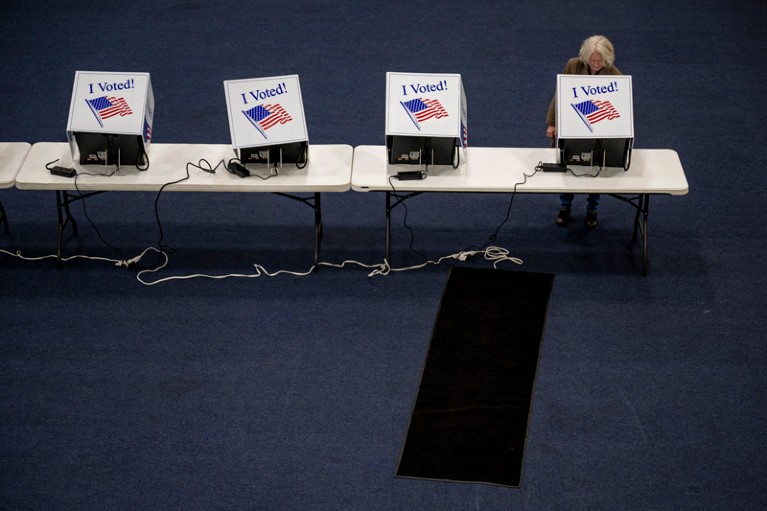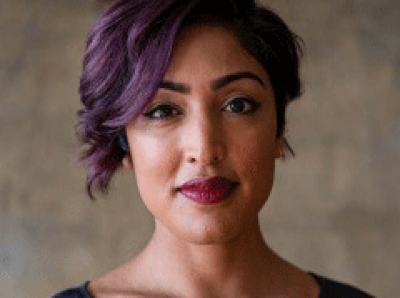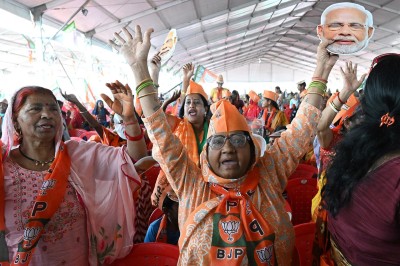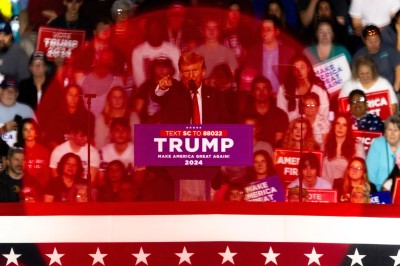By the end of this year, voters in some 65 countries and regions will have gone to the polls. That means close to half of the global population will have had the chance to cast a ballot of some sort, including almost 360 million people across the European Union. Not all of the world’s political procedures will be free and fair, but this year is still expected to represent the biggest manifestation of the democratic process in history. The geopolitical landscape of 2025 could therefore look very different from that of today, and it will have an impact not just on how science is funded, but also on which international collaborations will flourish or flounder.
In the middle of these swirling democratic processes will be researchers who study public sentiment and voting patterns, known as psephologists. These statistical scientists work both to predict future elections and to understand previous ones. Some psephologists work in universities, producing peer-reviewed research papers. Some work for polling companies, providing the data that underpin the field. Others work for political candidates, who want to know how to get the most bang for their campaigning buck. What unites them all, however, is a desire to better understand the political lie of the land through a methodical and data-driven approach. This year, they’re spoiled for data.
The US presidential election in November is almost certain to be a rematch between President Joe Biden and former president Donald Trump. The world’s largest democracy, India, has seen incumbent populist Prime Minister Narendra Modi win a third term in office, albeit in a coalition government. British voters go to the polls next month, with Prime Minister Rishi Sunak lagging far behind his opponent Keir Starmer in opinion polls. Member states in the European Union will have elections for the bloc’s parliament this week, and various Australian states and Canadian provinces will hold general elections at some point in 2024.
“The American election is the one that really matters,” says John Curtice, a political scientist at the University of Strathclyde, UK. “It won’t necessarily change the outcome of the UK, EU or Indian elections, but it will impact their policies for the next five years.”
Psephology for science
Research suggests that the voting public in those four jurisdictions think that government support for science is important, yet that rarely translates to science policy being a significant issue on the campaign trails. A 2023 poll by the Campaign for Science and Engineering, a non-partisan organization that lobbies for better science funding in the United Kingdom, concluded that almost 60% of people think that research funding should be a high priority for politicians. However, only about 40% said that it is currently a high priority for either of the two largest UK political parties. In 2020, more people in India said they had faith in scientists than did those in any other nation, according to a survey by the Pew Research Center in Washington DC. In the United States, trust in science has fallen from 87% at the start of the COVID-19 pandemic to 73%, but 78% of US adults still agree that government spending on science is worthwhile, according to a 2023 Pew Research Center report.
And, says Curtice, “there are still votes to be won and lost on certain science issues. One is the existential threat of climate change”.
AI-fuelled election campaigns are here — where are the rules?
There are two fundamental points that those trying to predict results through polling need to understand, says Cary Funk, a senior adviser at the Aspen Institute Science and Society Program in Washington DC. “The first is figuring out who is actually going to vote. In the United States, we have a large number of people who are eligible but don’t,” she says. “The second is that you have to figure out who they’re going to vote for.”
There are a lot of factors to consider in analysing these voting patterns, using surveys and polls ahead of votes. But no matter how hard you try, you never have the full picture until the votes are counted, says Funk. Even so, researchers try to get as close as they can.
Funk started out in social psychology, earning a PhD at the University of California, Los Angeles. It was during her first job that she became hooked on elections. “I started working for CBS News when I graduated, and it gave me a front-row seat doing pre-election surveys. That’s where I learnt the nuts and bolts of polls,” she says. “These days I’m more focused on explaining public opinion so that we understand why certain results happened. That has a bit more posterity.”
Accounting for bias
When collecting data from the public to gauge electoral sentiment, the survey design is important — it matters how questions are posed, say researchers. If a voter is asked whether they’ll vote for candidate A, B, C or D, there is a slight advantage for candidate A because they’re first in the list, says Funk. That’s why the order should be randomized and shuffled for each survey participant. Psephologists and pollsters also need to be aware of other biases that they might unwittingly introduce into their methodology.
“It’s more difficult to get certain kinds of people to complete a poll. If those characteristics are correlated with the voter outcome, then you have a problem,” she says. In the United States, for example, those with degrees are more likely to vote for left-wing candidates, and are also more likely to complete a poll. That risk of inadvertently skewing results can apply to any number of variables, which is why part of psephological research has been about identifying which demographic factors align with voting intentions. That helps poll designers to ensure they include these various groups in their polling.

US voters will go the polls in what political scientists say is the most significant election of 2024.Credit: Jim Watson/AFP/Getty
It is equally important to know who to filter out. More than 80% of the polls that track US public opinion are done using online opt-in surveys, according to a 2020 report by the Pew Research Center. In other words, anyone who wants to log on and take part can do so. Not only does that mean that the data are unlikely to be representative, but also it introduces the risk of ‘bogus respondents’ — people who either seek to push their own political narrative or who rush through a survey without paying attention to the questions.
Despite all of these efforts, election polling can go fantastically wrong. Perhaps the most famous example was US president Harry Truman winning against Thomas Dewey in the 1948 election. Thanks to skewed polls that turned out to be incorrect, in what is now an iconic photo, the victorious Truman was pictured brandishing an early edition of the Chicago Daily Tribune that proclaimed, “Dewey Defeats Truman.”
Usually, these kinds of problem crop up when corners are cut, says Funk. “The main error is caused when people stop polling too early,” she says. “If you stop two weeks ahead of time, then that might not be accurate because people change their minds.” Small and non-representative sample sizes are a problem, as is outdated methodology. “A lot of our thinking is traditionally based on everyone voting on the same day, but that’s shifted dramatically over the years with mail ballots,” she says.
By knowing how to design polling such that it gives reliable predictions, Funk has proved herself a valuable colleague for academics studying other societal trends.
For instance, between 2001 and 2010, Funk and her co-workers helped Thomas Huff, then vice-provost for life sciences and research at Virginia Commonwealth University in Richmond, Virginia, to conduct a national survey of the US public’s views on science and biotechnology. At the time, politicians were grappling with how to understand and regulate the use of embryonic stem cells in research and genetic therapies. Huff and Funk’s work helped policymakers to improve their understanding of how the public perceived these issues. The project was a good example of how scientists and polling experts can complement each other. Without Huff’s background in the field, Funk might have struggled to design a survey, and without Funk, Huff could have inadvertently ended up with inaccurate results.
Caution to the wind
The psephologist’s toolkit is now expanding into less orthodox territory. In a 2015 paper, researchers at Columbia University and Microsoft Research, both in New York City, showed that they could accurately predict the 2012 US presidential election results by using daily opinion polls sent to gamers through the Xbox platform1. By all accounts of established survey science, this sample should have been so skewed as to be useless for making such broadscale forecasts. But, after the authors stratified the results and conducted a thorough statistical sorting of the data, they were able to make predictions that were consistent with conventional polls.
What the India election means for science
The approach, which uses mathematics to account for biases — rather than relying on conventional methodologies to eliminate them — is gaining ground. Proponents argue that surveying non-representative samples can be just as valuable when appropriate statistical judgements are made, and they’re usually cheaper and faster to complete.
Whatever methods psephologists use, they rarely commit to definitive statements and instead tend to make a prediction with a number of caveats — perhaps forever haunted by the Chicago Daily Tribune front page.
Curtice, however, is feeling assertive about forecasting Sunak and his Conservative Party’s downfall at the forthcoming UK general election, giving Sunak just a 1% chance of turning things around. Curtice’s confidence stems from his studies of recent UK elections in which parliaments ran to full term. Even though Sunak has called an early election, he’s so close to the end of his term that full-term elections are the most relevant comparison, says Curtice. He searched for a historical example in which a prime minister managed a comeback of similar scale. The conclusion? There is no precedent, he says.
Geopolitical weather
Scientists might also want to take note of psephological predictions, because they offer a glimpse of future government policies relevant to funding and other research interests.
“Science funding is a little bit protected [from the US presidential election] because a lot of the agencies’ budgets are committed for five years and Congress tends to be somewhat bipartisan on science, so I’m not as worried about that,” says Caroline Wagner, a researcher at Ohio State University in Columbus who specializes in public policy that relates to science and innovation. “It’s more about the high-level talks, such as bilateral international umbrella agreements that include science and technology agreements.”
One such agreement on research collaborations between Beijing and Washington DC is pending, says Wagner. Relations with China under the Biden administration have been chilly, she says, but Trump’s stance during his presidency was especially frosty. “The result of the election could deeply influence whether China is willing to sign,” she says. “And with a low-trust relationship like the United States and China, there tends to be a need for these agreements.”
How five crucial elections in 2024 could shape climate action for decades
The next US president will have an uphill battle rebuilding scientific exchange with China. A 2023 analysis of data from the Nature Index showed that collaborative research output between the two countries shrank by 15% between 2020 and 2022. There are signs, however, that scientists in China have started to favour working with colleagues in countries such as Singapore and South Korea, which are either closer to home or deemed to be strategically important to Beijing.
On specific policy issues, the two US presidential candidates differ widely on the environment, with Trump arguing for weaker environmental regulations and Biden pushing renewable energy. Climate change is one of the most divisive topics in the United States; 93% of Democrats agree with the scientific consensus that human activity is warming the world’s climate, compared with just 55% of Republicans, according to a poll carried out by researchers at the University of Maryland in College Park. Those numbers could shift if the summer is marked by extreme weathers, says Curtice. “If we see fires, it’ll come back up the agenda.”




